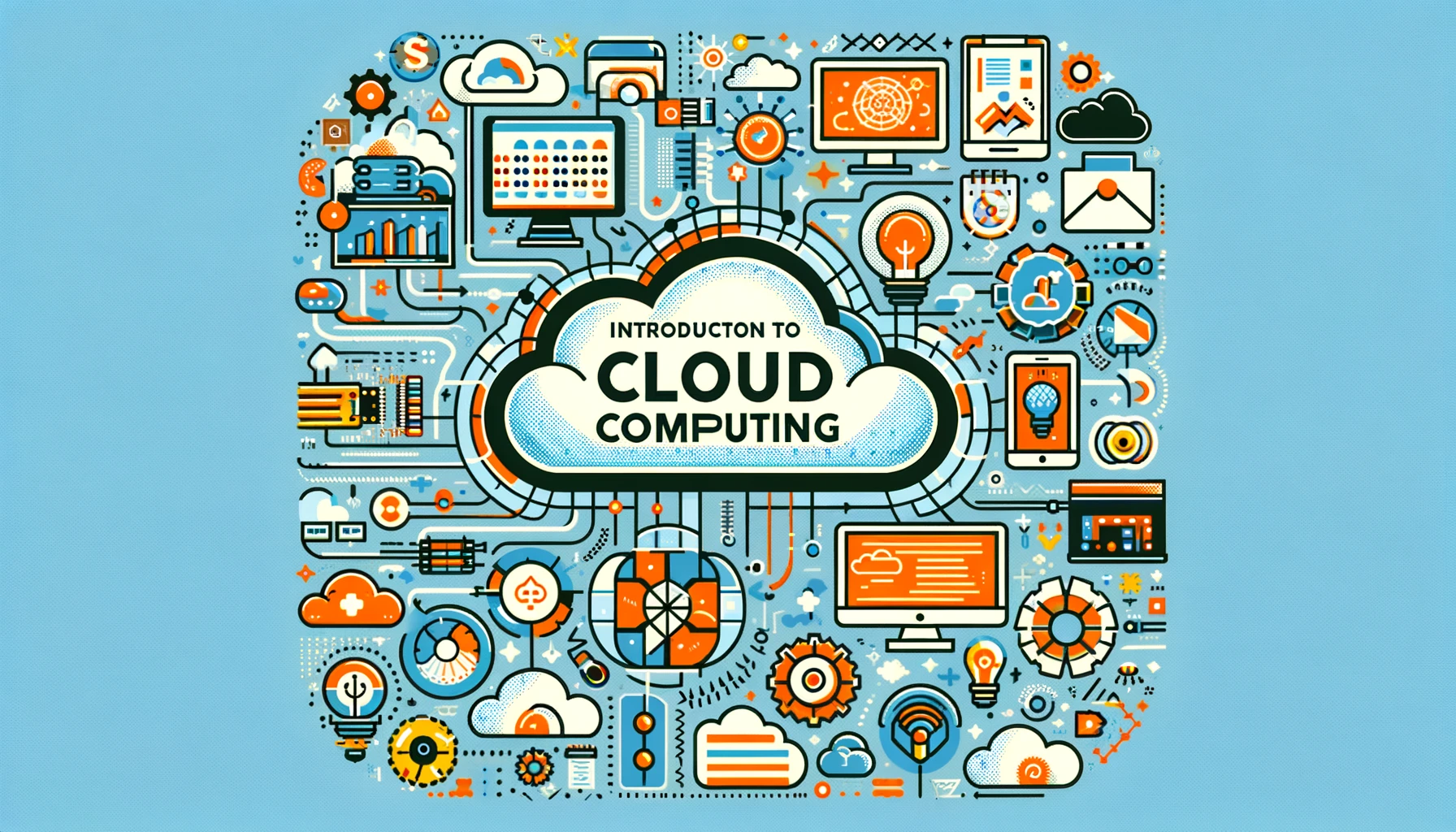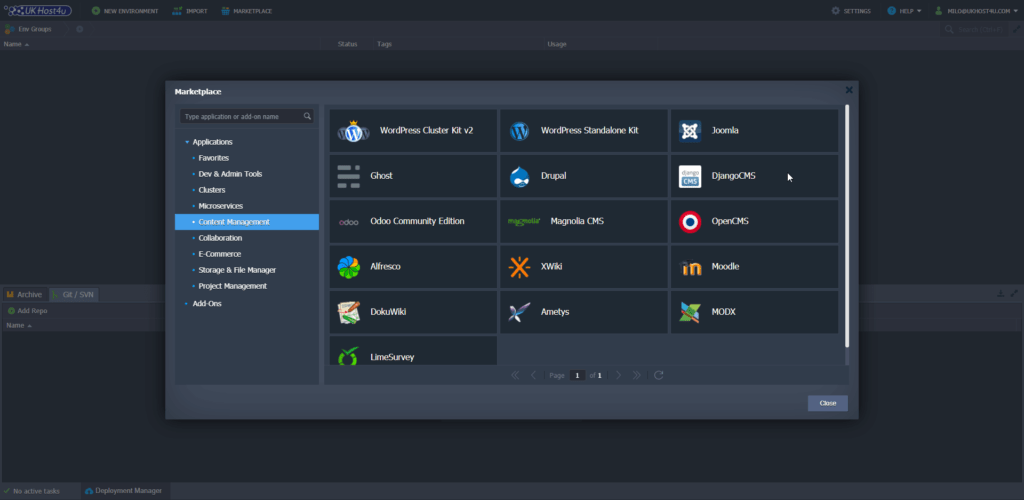An Introduction to Cloud Computing

Cloud Computing refers to a form of virtual machines called instances, which you can deploy autonomously using an orchestration interface. It has become one of the favorite hosting solutions for companies due to its simplicity and financial attractiveness for on-demand IT services such as servers, databases, software, networks, storage, and more.
However, choosing the right cloud provider is critical for your business and organization. You’ll also need to be aware of the key features you need to look for. Rest assured, to avoid making any mistakes, we will guide you through the different types of cloud solutions available on the market, so you can select the offer that best suits your needs, priorities, and budget.
Why Cloud Computing is Popular
Cloud computing has gained immense popularity due to its flexibility, scalability, and cost-effectiveness. Businesses no longer need to invest heavily in physical infrastructure. Instead, they can utilize cloud services to meet their IT needs on a pay-as-you-go basis. This reduces capital expenditure and allows for more efficient allocation of resources.
Key Features to Consider
When selecting a cloud provider, it’s important to consider several key features:
- Scalability: Ensure that the cloud service can easily scale up or down based on your business needs.
- Reliability: Look for providers with high uptime guarantees and robust disaster recovery options.
- Security: The provider should offer strong security measures, including data encryption, firewalls, and compliance with industry standards.
- Support: Reliable customer support is essential for resolving any issues that may arise quickly.
- Cost: Compare pricing models to ensure that the service is within your budget and offers good value for money.
By considering these factors, you can make an informed decision that aligns with your business goals and ensures a smooth transition to cloud computing.
What are the Types of Cloud Computing?
The three main types of cloud computing are Infrastructure-as-a-Service (IaaS), Platform-as-a-Service (PaaS), and Software-as-a-Service (SaaS). Each type provides a different level of control, flexibility, and management to meet various needs.
Infrastructure-as-a-Service (IaaS)
IaaS offers the most control over your cloud resources. It provides virtualized computing resources over the internet, such as virtual machines, storage, and networks. With IaaS, you can rent IT infrastructure on a pay-as-you-go basis, allowing you to scale resources up or down as needed. This type of cloud service is ideal for businesses that want full control over their infrastructure but without the cost and complexity of owning and managing physical servers.
Platform-as-a-Service (PaaS)
PaaS sits in the middle of the cloud computing stack, providing a platform that allows developers to build, deploy, and manage applications without dealing with the underlying infrastructure. It includes development tools, database management systems, and middleware. PaaS is perfect for developers who want to focus on creating software without worrying about managing the underlying hardware and software layers. It also supports collaboration among development teams, making it easier to manage the application lifecycle.
Software-as-a-Service (SaaS)
SaaS offers the least control but the most ease of use. It delivers software applications over the internet, on a subscription basis. Users can access these applications via web browsers, eliminating the need to install and run software on individual computers. SaaS is ideal for businesses looking for turnkey solutions without the need for in-house maintenance and updates. Popular examples of SaaS include email services, customer relationship management (CRM) systems, and collaboration tools.
Each type of cloud computing service offers unique benefits, making it important to choose the one that aligns best with your business objectives and technical requirements. By understanding the differences between IaaS, PaaS, and SaaS, you can make an informed decision that optimizes your operations and enhances your business agility.
What are the Different Uses of Cloud Computing?
Cloud computing offers a versatile range of applications that cater to various business needs and personal uses. Here are some of the primary uses of cloud computing:
1. Data Storage & Back-Ups
With cloud computing, you can easily store and access all your files as long as you have an internet connection. This service is typically priced based on the amount of storage you consume, allowing you to avoid the daily maintenance of storage infrastructure. You can also manage and automate your backup data, ensuring your data is stored in a secure and highly available environment. Setting up frequent and timely backups in the cloud is a risk-free solution, ideal for enhancing your IT infrastructure’s flexibility and leveraging big data analytics and mobile computing.
2. SaaS Deployment
Software as a Service (SaaS) extends the concept of the Application Service Provider model. Modern SaaS vendors usually develop and manage their own software, which predominantly relies on the internet and only requires a web browser to use. SaaS solutions typically utilize a multi-tenant architecture, serving multiple businesses and users while partitioning their data accordingly. This makes SaaS a scalable and efficient way to deploy software without the need for extensive local installations.
3. PaaS Deployment
Platform as a Service (PaaS) can be delivered in various ways, including:
- Public Cloud: Where the consumer controls software deployment with minimal configuration options, while the host provides the networks, servers, storage, operating system, database, and other services.
- Private Service: A software or appliance behind a firewall or hosted on a private network only accessible with the correct credentials.
- Software: A software deployed on a public infrastructure as a service.
PaaS offers a comprehensive environment for developers to build, test, and deploy applications without managing underlying infrastructure.
4. Data Management & Analysis
Cloud computing enables big data analytics, allowing businesses to tap into vast quantities of structured and unstructured data to extract valuable business insights. Retailers and suppliers use this data to target advertising and marketing campaigns to specific segments, while social networking platforms provide analytics on behavioral patterns to derive meaningful information.
5. AI Integration
Artificial Intelligence (AI) is closely linked with cloud computing, bringing AI capabilities into everyday use through digital assistants like Siri, Google Home, and Amazon’s Alexa. In a business context, AI in the cloud helps organizations become more efficient, strategic, and insight-driven. Cloud computing offers the flexibility, agility, and cost savings necessary for hosting AI data and applications.
6. Application Development
Cloud computing is essential for application development across various business sizes, from growing SMEs and startups to large international groups. It supports the entire development lifecycle, from data storage and backup to deployment and analysis. Depending on your specific needs, you can choose the appropriate type of cloud service to optimize your application development processes.
These diverse uses of cloud computing highlight its importance and versatility in the modern digital landscape, offering solutions that enhance productivity, security, and scalability for businesses of all sizes.
What are the Different Types of Cloud Computing?
Cloud computing can be categorized into three primary types: Public Cloud, Private Cloud, and Hybrid Cloud. Each type offers unique benefits and is suitable for different business needs and use cases.
Public Cloud
Public Cloud resources are shared among multiple users, providing the greatest flexibility and scalability. This solution allows you to control your budget effectively, as invoicing is calculated precisely based on the resources consumed by each of your instances. Public clouds are managed by third-party cloud service providers, making it a cost-effective option for businesses that do not want to invest heavily in on-premise infrastructure. Examples of public cloud services include Amazon Web Services (AWS), Microsoft Azure, and Google Cloud Platform (GCP).
Private Cloud
In the Private Cloud, resources are dedicated to a single organization, ensuring a highly secure and isolated environment. This setup makes your infrastructure watertight, with costs being more predictable. Billing is based on the host machines you require, and you are free to deploy the instances you need at any time. Private clouds are ideal for organizations with stringent security requirements, such as financial institutions or healthcare providers. They can be managed internally or by a third-party provider but are used exclusively by one organization.
Hybrid Cloud
The Hybrid Cloud solution combines elements of both Private and Public Clouds. This allows you to utilize the Private Cloud for your core, sensitive operations and deploy instances in the Public Cloud on an ad hoc or stand-alone basis when additional resources are needed. This approach helps you exceed the limits of your Private Cloud without having to invest in additional host machines. Hybrid clouds offer the flexibility to scale your infrastructure as needed while maintaining control over critical data and applications. They are ideal for businesses that require a balance between the security of a private cloud and the scalability of a public cloud.
By understanding the different types of cloud computing, businesses can choose the best solution that aligns with their specific needs, ensuring optimal performance, security, and cost-efficiency.
What Should You Look for in Cloud Computing Solutions?
When choosing a cloud computing solution, it’s essential to evaluate various factors to ensure it meets your business needs and allows for future growth. Here are some key aspects to consider:
Powerful Features
Look for a cloud provider that offers robust features, high availability, and a wide range of applications. Some providers may only offer a fraction of what cloud computing can deliver, potentially limiting your capabilities and growth. Ensure the provider you choose supports the full spectrum of cloud computing benefits.
Here’s a taste of what we offer at UKHost4u, which will not limit your possibilities:
- Scalability: Easily scale your resources up or down based on your current needs, ensuring you only pay for what you use.
- High Availability: Our cloud solutions are designed to be highly available, minimizing downtime and ensuring your applications and services are always accessible.
- Comprehensive Support: Enjoy 24/7 technical support to help you with any issues or questions you might have, ensuring smooth and uninterrupted operations.
- Security: Robust security measures including encryption, firewalls, and regular updates to protect your data from cyber threats.
- Flexible Pricing: Various pricing models to suit your budget, allowing you to manage your costs effectively without compromising on features.
- Advanced Features: Access to the latest technologies and tools, such as machine learning, big data analytics, and AI capabilities, to help your business stay ahead of the competition.
- Integration: Seamless integration with existing systems and third-party services to streamline your workflows and improve efficiency.
By choosing a cloud computing solution that offers these powerful features, you can ensure your business has the flexibility, security, and performance it needs to succeed in today’s digital landscape.
Here’s a taste of what we are offering you at UKHost4u, and believe me, those will not limit your possibilities.

Install all your favorite CMS in a click with UKHost4u Cloud Solutions Marketplace.
Billing Method
One of the primary benefits of the Cloud Computing model is its flexibility and cost-efficiency. You only pay for what you use, allowing you to create and stop your machines whenever necessary. This flexibility ensures you can adjust your resources based on your evolving needs. Therefore, it’s crucial to understand your provider’s billing method. Make sure their pricing is transparent and straightforward to avoid any unexpected charges. Look for providers that offer clear billing statements and flexible payment options to manage your budget effectively.
Data Center Location
The geographical location of the data centers and servers used by your cloud provider is another critical factor. Although you can access cloud services from anywhere, the server’s location can impact connection speeds, loading times, and overall performance. Choosing a provider with data centers close to your primary user base can help ensure faster data transmission and a better user experience. Consider providers with multiple data centers in strategic locations to optimize your website’s performance.
Support
The level of support provided by your cloud hosting provider can significantly impact your experience. You need a support team that is available 24/7, ready to assist you with any issues that may arise. Quality support ensures minimal downtime and quick resolution of any problems, which is essential for maintaining the smooth operation of your services. Our 24/7 Support team at UKHost4u has been certified level 3 by Jelastic’s team, guaranteeing top-notch assistance for our cloud solutions.
By considering these factors—powerful features, billing methods, data center locations, and support—you can select a cloud computing solution that meets your needs and supports your business growth effectively.
What are the Advantages of UKHost4u’s Cloud Solutions?
Pay-per-Use
One of the standout features of UKHost4u’s cloud solutions is the pay-per-use billing model. Unlike traditional hosting plans where you pay for a fixed amount of resources regardless of usage, our cloud solutions ensure you only pay for what you consume. You can set your own minimum and maximum resource limits, and our platform will automatically adjust your billing based on your actual usage. This model is cost-effective and ensures you are not overpaying for unused resources, making it an ideal choice for businesses of all sizes.
One-Click Deployment
UKHost4u’s cloud solutions simplify the deployment of even the most complex infrastructures with just a few clicks. This ease of use extends to our instance duplication feature, allowing you to create and replicate instances across all your machines within minutes. This functionality saves time and reduces the complexity associated with manual deployments, ensuring your applications are up and running quickly and efficiently.
Security & Reliability
At UKHost4u, we prioritize the security and reliability of our cloud solutions. Our systems and infrastructure are regularly updated by our dedicated teams to protect your data from potential threats. Additionally, our platform integrates numerous security features, such as firewalls and load balancers, to help you secure your network comprehensively. These measures ensure that your data remains safe and your services are reliable, providing peace of mind and enabling you to focus on growing your business.

To Conclude on Cloud Computing
Cloud computing offers unparalleled flexibility, scalability, and security for businesses of all sizes. At UKHost4u, we provide robust cloud solutions designed to meet your unique needs, whether you’re deploying, developing, or launching websites and applications. Our cloud environments are highly available, scalable, and secure, ensuring optimal performance and reliability.
Get Started Today
Explore our brand new Cloud Solutions and take advantage of our 14-day FREE trial offer. This allows you to experience the benefits of our platform firsthand and see how it can transform your IT infrastructure.
Need Assistance?
If you have any questions or need assistance, our Support Team is here to help. Contact us directly using our Live Chat or via our Ticket System. We’re available 24/7 to ensure you get the support you need when you need it.
Don’t wait any longer—sign up and start leveraging the power of cloud computing with UKHost4u today.

